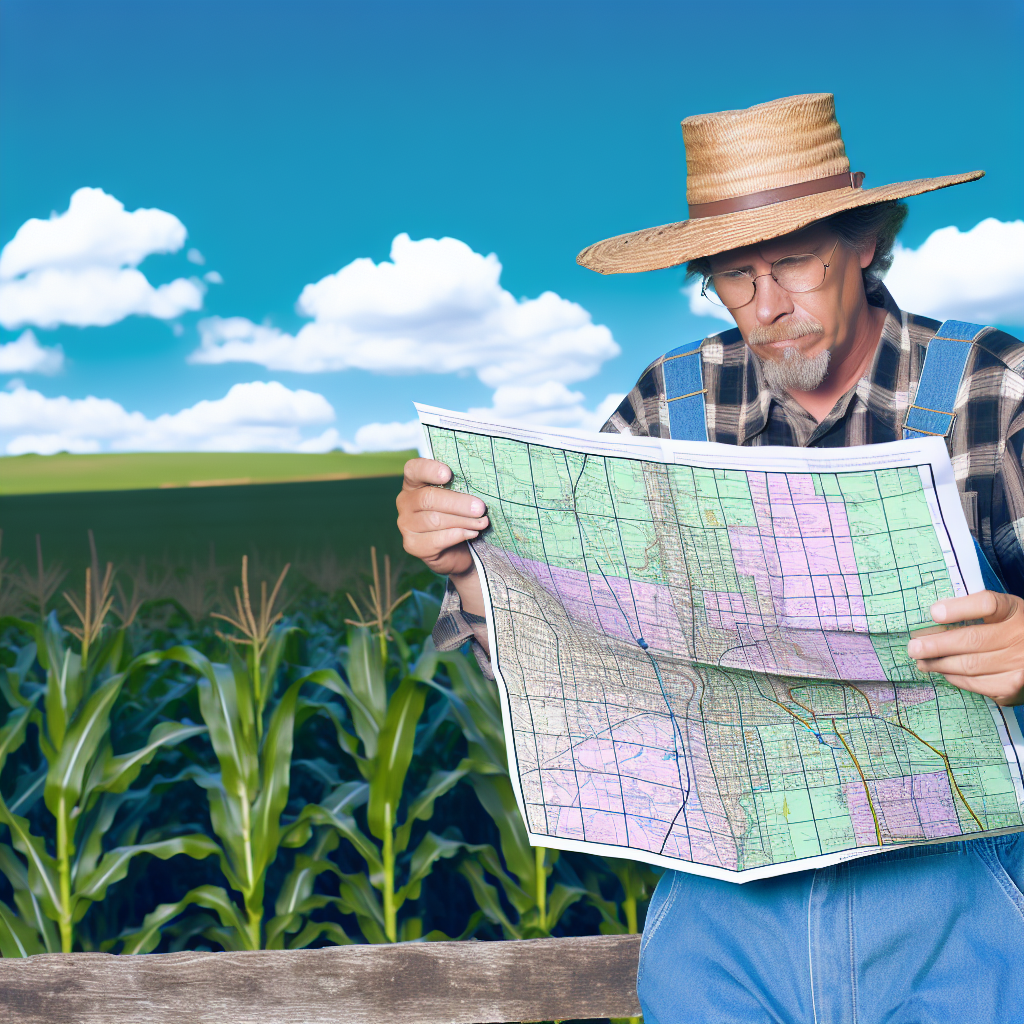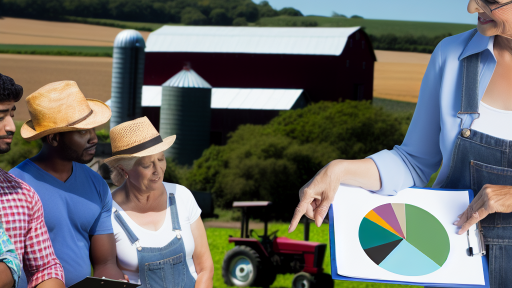Overview of Land Use Laws and Their Importance for Farmers
Defining Land Use Laws
Land use laws regulate how land can be used and developed.
These laws vary by region and address zoning, conservation, and agriculture.
They include both local ordinances and federal regulations.
Benefits for Farmers
Understanding land use laws benefits farmers significantly.
These laws can protect farmers’ rights to use their land for agricultural purposes.
They also ensure sustainable practices that support long-term productivity.
Impact on Farming Practices
Farmers must adapt their practices according to these laws.
Land use regulations may dictate crop selection and farming methods.
Additionally, they can influence the availability of land for farming.
Challenges Faced by Farmers
Navigating land use laws can pose challenges for farmers.
Compliance with regulations can require significant resources.
Moreover, changes in laws can lead to uncertainty in farming operations.
Importance of Compliance
Compliance with land use laws is crucial for farmers.
Failure to adhere to these laws may result in penalties or fines.
Furthermore, it can jeopardize the operation of their farms.
Transform Your Agribusiness
Unlock your farm's potential with expert advice tailored to your needs. Get actionable steps that drive real results.
Get StartedFuture Trends in Land Use Laws
The landscape of land use laws is continually evolving.
Farmers must stay informed about regulatory changes.
Emerging trends can significantly impact agricultural practices and sustainability.
Types of Land Use Regulations
Zoning Laws
Zoning laws dictate how land can be used in various areas.
They ensure that specific types of activities occur in designated places.
For example, residential zones prohibit large-scale farming operations.
Farmers must understand local zoning ordinances.
This includes knowing permitted activities on their land.
Ignoring zoning laws can result in fines or other penalties.
Environmental Laws
Environmental laws protect natural resources and ecosystems.
Farmers must comply with regulations regarding land use and resource management.
These regulations often guide sustainable land practices.
For instance, farmers may need permits for water use.
They must also adhere to pollution control standards.
Failure to comply can have legal repercussions.
Agricultural Laws
Agricultural laws govern the production and marketing of crops and livestock.
They aim to protect consumers and ensure fair practices.
Farmers must be aware of laws concerning pesticide use.
Additionally, they need to follow regulations related to food safety.
Understanding these laws helps maintain a stable market environment.
This knowledge also aids in building consumer trust.
The Role of Local Governments in Land Use Planning and Management
Introduction to Local Governance
Local governments play a crucial role in land use planning.
They establish regulations that guide how land can be used.
Furthermore, they provide a framework for sustainable development.
Showcase Your Farming Business
Publish your professional farming services profile on our blog for a one-time fee of $200 and reach a dedicated audience of farmers and agribusiness owners.
Publish Your ProfileKey Responsibilities of Local Governments
Local governments implement zoning laws that categorize land types.
They make decisions on land use permits for various projects.
Moreover, they engage with the community to gather feedback.
This process fosters transparency in decision-making.
Regulatory Framework
Local governments create a regulatory framework for land use.
This framework ensures land use aligns with community goals.
Additionally, it addresses environmental concerns and public health.
Planning Authorities
Planning authorities manage comprehensive plans for land use.
They assess land needs based on population growth and development.
Also, these authorities predict future land use trends.
Community Engagement and Input
Community engagement is vital for effective land use planning.
Local governments hold public meetings to discuss land proposals.
These meetings encourage citizen participation in planning decisions.
Furthermore, they help identify community priorities and concerns.
Outreach Programs
Outreach programs educate residents about land use processes.
They provide information on how local regulations affect property.
This knowledge empowers citizens to participate actively.
Challenges in Land Use Management
Local governments often face challenges in land use management.
These challenges may include limited resources or conflicting interests.
Additionally, changing regulations can complicate planning efforts.
Balancing Development and Preservation
Finding a balance between development and land preservation is essential.
Local governments must evaluate economic benefits against environmental impacts.
This balance ensures community growth without sacrificing natural resources.
Adapting to Change
Local government officials must stay adaptable to changes.
They need to respond to evolving community needs and environmental issues.
This adaptability is critical for effective land use management.
Explore Further: Navigating Zoning Regulations in Agriculture
Key Legal Terms and Concepts Every Farmer Should Know
Understanding Land Use Rights
Land use rights refer to the legal permissions for utilizing land.
These rights dictate what activities you can conduct on your property.
Farmers should familiarize themselves with local zoning laws.
Such regulations impact agricultural practices and property value.
The Importance of Zoning Laws
Zoning laws divide land into districts for specific uses.
Each zone may have restrictions on building and farming activities.
Understanding zoning aids in compliance and prevents legal issues.
Consult your local authorities for zoning classifications.
Types of Zoning
- Residential: Areas designated for housing.
- Agricultural: Zones meant for farming and related activities.
- Commercial: Spaces intended for business operations.
- Industrial: Areas reserved for manufacturing and production.
Property Rights and Ownership
Property rights include various legal entitlements related to land ownership.
Fee simple ownership grants full control over the property.
Lease agreements allow farmers to utilize land owned by others.
Understand the terms of any lease carefully to avoid conflicts.
Easements and Access Rights
Easements provide a right of use over another’s land.
Showcase Your Farming Business
Publish your professional farming services profile on our blog for a one-time fee of $200 and reach a dedicated audience of farmers and agribusiness owners.
Publish Your ProfileThese are essential for accessing roads, utilities, or drainage.
Clarifying easements helps to protect the farming operations.
Permits and Licensing
Many farming activities require specific permits or licenses.
These may include water usage, pesticide application, and land development.
Always check with local or state authorities for required permits.
Consequences of Non-Compliance
Not obtaining necessary permits can result in fines.
Non-compliance may also lead to shutdown of operations.
It’s critical to maintain records of all permits and licenses.
Environmental Regulations
Farmers must comply with local, state, and federal environmental laws.
These regulations govern water usage, waste management, and chemical applications.
Understanding these laws protects not only the land but also public health.
Sustainable Practices and Regulations
Implementing sustainable practices can improve compliance with regulations.
Such practices enhance soil health and promote biodiversity.
Additionally, these methods can lead to long-term profitability.
Legal Remedies and Dispute Resolution
Disputes over land use may arise in agricultural operations.
Understanding legal remedies can help resolve conflicts efficiently.
Mediation and arbitration are common alternatives to litigation.
Consider consulting with a legal expert for guidance.
Gain More Insights: Navigating Farm Labor Standards
Impacts of Land Use Laws on Agricultural Practices and Crop Choices
Understanding Land Use Laws
Land use laws dictate how farmers can use their land.
These laws vary by region and can significantly affect farming practices.
Farmers must stay informed about local regulations to remain compliant.
Comprehending these laws is crucial for effective agricultural planning.
Influence on Crop Selection
Land use laws often dictate which crops can be grown.
For instance, certain regions may favor specific crops due to climate factors.
Additionally, restrictions might limit the use of certain fertilizers or pesticides.
Farmers must adapt their crop choices to coincide with these regulations.
Impact on Farming Techniques
Land use laws can dictate farming techniques based on environmental concerns.
No-till farming may be encouraged under certain laws to prevent erosion.
Moreover, some laws promote sustainable practices over traditional ones.
Farmers who embrace these techniques may receive incentives.
Economic Consequences
Compliance with land use laws can be financially burdensome for farmers.
Investing in new technologies or practices often requires significant capital.
Conversely, non-compliance can lead to hefty fines and legal battles.
Farmers must weigh the costs of compliance against potential benefits.
Community and Environmental Impact
Land use laws aim to protect local ecosystems and communities.
Farmers play a crucial role in implementing these regulations effectively.
Successful compliance contributes to the sustainability of local agriculture.
Ultimately, a healthy balance benefits both farmers and the environment.
Future Considerations
As regulations evolve, farmers must adapt accordingly.
Showcase Your Farming Business
Publish your professional farming services profile on our blog for a one-time fee of $200 and reach a dedicated audience of farmers and agribusiness owners.
Publish Your ProfileThis could involve diversifying crops or changing farming methods.
Staying proactive can ensure long-term success in an ever-changing landscape.
Engaging with local agricultural organizations can provide valuable support.
Gain More Insights: Migrant Worker Protections in Agriculture

Navigating Permits and Licenses: What Farmers Need to Know
Understanding Land Use Regulations
Land use regulations govern how farmers can use their land.
They vary by location and type of agricultural activity.
Therefore, farmers must familiarize themselves with local laws.
Types of Permits
Farmers may require various permits for their operations.
Common permits include zoning permits and building permits.
Additionally, special permits may be needed for irrigation or livestock management.
Licenses for Agricultural Activities
Many agricultural activities require licenses for compliance.
Pesticide application, for example, often necessitates certification or a license.
Farmers should check state and federal regulations for specific licensing requirements.
Applying for Permits and Licenses
The application process can be complex, so preparation is essential.
Applicants need to gather necessary documentation before starting.
Submitting accurate information speeds up the approval process.
Preventing Common Pitfalls
Farmers should avoid common mistakes when applying for permits.
Failing to familiarize oneself with local regulations can lead to issues.
Also, overlooking necessary licenses can result in fines.
Maintaining Compliance
Once permits and licenses are obtained, compliance is crucial.
Regularly review and renew permits to avoid penalties.
Staying informed on changes in regulations helps ensure ongoing compliance.
Consulting Experts
When in doubt, seeking expert advice is beneficial.
Legal consultants specialize in agricultural law and can offer guidance.
Additionally, local agricultural extensions provide valuable resources.
See Related Content: Worker Rights in Agricultural Settings
Case Studies: Land Use Disputes and Their Resolutions in Agriculture
Introduction to Land Use Disputes
Land use disputes often arise in agricultural settings.
These conflicts may involve boundaries, zoning, or regulatory issues.
Understanding their nature is crucial for effective resolutions.
Case Study One: The Smith Family Farm
The Smiths faced a boundary dispute with a neighboring property owner.
The neighbor claimed that the Smiths had encroached on their land.
This dispute escalated, leading to legal action.
Resolution Steps
The Smiths engaged a surveyor to assess their property lines.
Upon examination, it was clear that the boundaries were accurate.
After presenting this evidence, negotiations between the two parties resumed.
Ultimately, they agreed on installing new fences to prevent future misunderstandings.
Case Study Two: Green Acres Organic Farm
Green Acres faced issues related to zoning regulations.
Local officials contested the farm’s use of land for organic practices.
This challenge threatened the farm’s operational model.
Resolution Steps
The farm owner, Laura Greene, organized a community meeting.
Showcase Your Farming Business
Publish your professional farming services profile on our blog for a one-time fee of $200 and reach a dedicated audience of farmers and agribusiness owners.
Publish Your ProfileShe gathered support from fellow organic farmers and consumers.
Through collaboration, they proposed a new zoning ordinance.
After presenting their case, the local council approved the new regulations.
Case Study Three: Willow Creek Vineyards
Willow Creek experienced disputes over water rights for irrigation.
Nearby ranchers claimed that their water supply was being depleted.
This situation led to heightened tensions in the community.
Resolution Steps
Jane Lawson, the vineyard owner, initiated a mediation process.
She invited all stakeholders to discuss water usage fairly.
As a result, they crafted a collaborative water management plan.
This agreement ensured equitable distribution of water resources.
Lessons Learned
These case studies highlight the importance of communication in resolving disputes.
Effective negotiations can lead to sustainable solutions for all parties.
Moreover, understanding local laws is vital for farmers facing disputes.
Lastly, collaboration fosters community support and strengthens relationships.
Future Trends in Land Use Laws: What Farmers Should Anticipate
Emerging Regulations
Farmers should prepare for increasing regulations on land use.
These regulations often aim to promote sustainability and environmental protection.
For example, stricter guidelines may emerge related to pesticide use.
Additionally, water usage laws will likely become more stringent.
Healthy ecosystems will play a major role in future land use decisions.
Climate Change Considerations
Climate change will significantly shape future land use laws.
Adaptation strategies will gain prominence in agricultural policies.
Farmers may face guidelines on crop selection based on climate resilience.
Moreover, incentives for carbon footprint reduction could be introduced.
Overall, land use laws will likely reflect climate-related challenges.
Technological Advancements
Innovative technologies will influence land use regulations.
Farmers can expect monitoring systems to become standard practice.
These systems may track resource usage and environmental impact.
Moreover, data collection will improve compliance and policy effectiveness.
Technology will help in crafting more targeted and efficient regulations.
Community Engagement
Community involvement in land use planning will increase.
Farmers should engage with local governments and stakeholders.
Participatory processes will shape policies that affect land use.
Local knowledge can inform better decision-making and strategies.
As a result, farmers will play a crucial role in future regulatory frameworks.
Market Forces and Economics
Economic trends will also impact land use laws.
Farmers may need to adapt to shifts in market demands.
For instance, growing interest in organic products will influence land use.
Moreover, land values may fluctuate due to regulatory changes.
This will require farmers to stay informed about market dynamics.
Additional Resources
Farm & Commodity Policy – USDA ERS
Showcase Your Farming Business
Publish your professional farming services profile on our blog for a one-time fee of $200 and reach a dedicated audience of farmers and agribusiness owners.
Publish Your ProfileUnderstanding Agricultural Law – Center for Agricultural and Shale …




